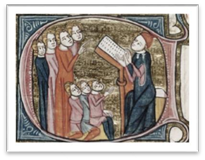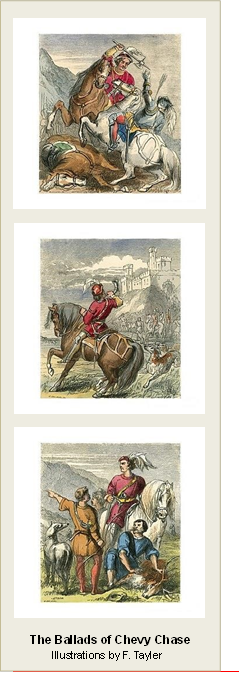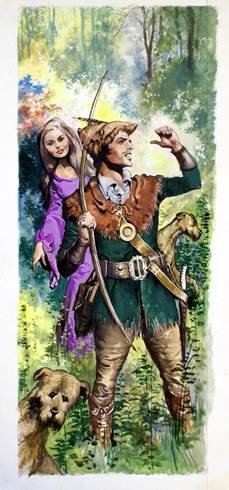Робочий аркуш (a worksheet): "Middle English Riddles and Folk Ballads. Robin Hood
Спецкурс з Літератури Великої Британії для учнів 10-11 класів
Тема: Medieval Literature
Middle English Riddles and Folk Ballads
ABOUT RIDDLES
![]()
Riddles have been ever present in literature of almost all peoples in all ages, including the Bible and the Koran. Riddles may have developed from an ancient belief in the magical power of words. Magic spells are often broken by solving a riddle, as in an ancient Greek legend when the ruler of Thebes, Oedipus, was to answer the riddle of the sphinx: “What is it that has one voice
and yet becomes four-footed and two-footed and three-footed?” (It’s the three ages of man as a crawling child, adult and an old
man with a walking stick.) Here are some riddles from the Exeter Manuscript in modern English translations.
|
Riddle 1 This world is adorned in diverse ways, decorated with rare ornaments. I saw a strange contraption, a fine traveler, grind against the grit and move, screaming, The strange creature couldn’t see; it had no shoulders, arms or hands; this oddity Has to move on one foot, travel fast over the salt -fields. It had many ribs and a mouth in its middle, useful to men. It carries foot in plenty, performs a service, each year it yields men a gift used by rich and poor. Tell me if you can, O man of wise words, what this creature is.
|
|
Riddle 2 I keep my snout to the ground; I burrow deep into the earth, and churn it as I go, Guided by the grey foe of the forest and by my lord, my stooping owner Who steps behind me; he drives me over the field, supports and pushes me, Broadcasts in my wake. Brought from the wood, borne on a wagon, then skillfully bound, I travel onward; I have many scars. There’s a green on one flank wherever I go, On the other my tracks ― black, unmistakable. A sharp weapon, rammed through my spine, Hands beneath me; another, on my head, firm and pointing forward, falls on one side So I can tear the earth with my teeth if my lord, behind me, serves me rightly. |
|
ABOUT BALLADS Ballads, or poems with exciting or romantic stories, were very popular in the Middle Ages. Few people could read them, so they were sung or recited by minstrels. Popular ballads would get into print as anonymous creations. Most ballads are written in rhymed short lines and short stanzas too, so that one can easily remember and sing them. The story often unfolds in a dramatic way, telling of mysterious death, fights and adventures; others tell about love, ghosts and fairies, or legendary heroes like King Arthur or Robin Hood. The Scottish Border, with its many battles, had lots to tell; ballads, originated there, such as Chevy Chase, have plenty of dialects words. In the 16th century, when printing became cheap, ballads were sold on broadsides, or sheets of paper. Yet, the first big collection of ballads was printed as late as in 18th century. It was Reliques of Ancient Poetry by Bishop Thomas Percy. It instantaneously became very popular, and encouraged others to discover old ballads or write new ones. |
|
A. Do the tasks on Riddles: 1. In fact, a riddle can be regarded as an extended metaphor. What concrete vocabulary helps us solve it? Which features of folk oral art do the riddles expose? 2. A kenning in Riddle 1 is very helpful in solving the puzzle. What is it and what is its meaning? What are the answers to the riddles? 3. Find antonyms in the riddles: single, common, uglyfy, slow, ahead of, pull, blunt. 4. Guess the words by its definitions: a) any mechanical device; b) to run harshly; c) anything created, whether animate or inanimate; d) produce; e) to agitate with violence or continued motion; f) to pull apart or in pieces by force.
B. Do the tasks on Ballads: 5. Why were ballads so popular in the Middle Ages? Why are most of them anonymous? 6. What are the ballads mostly about? Which part of the Great Britain was especially rich in ballads? |


|
ROBIN HOOD and MAID MARIAN
A bonny fine maid of a noble degree, With a hey down down a down down Maid Marian called by name, Did live in the North, of excellent worth, For she was a gallant dame.
For favour and face, and beauty most rare, With a hey down down and down down Queen Helen she did excel; For Marian then was praised of all men That did in the country dwell.
The Earl of Huntington, nobly born, With a hey down down and down down
That came of noble blood, To Marian went, with a good intent, By the name of Robin Hood.
With kisses sweet their red lips meet. With a hey down down and down down For she and the earl did agree; In every place, they kindly embrace, With love and sweet unity.
But fortune bearing these lovers a spight, With a hey down down and down down That soon they were forced to part, To the merry green wood Then went Robin Hood, With a sad and sorrowful heart. Perplexed and vexed, and troubled in mind, With a hey down down a down down She dressed herself like a page, And ranged the wood to find Robin Hood, The bravest of men in that age.
With quiver and bow, sword, buckler, and all With a hey down down and down down Thus armed was Marian most bold, Still wandering about to find Robin out, Whose person was better than gold.
|
This is the unique original Watercolour painting by Ernest Ratcliff
But Robin Hood, he himself had disguised, With a hey down down and down down And Marian was strangely attired, That they proved foes, and so fell to blows, Whose valour bold Robin admired.
|
They drew out their swords, And to cutting they went, With a hey down down and down down At least an hour or more, That the blood ran apace From bold Robin’s face, And Marian was wounded sore.
‘O hold thy hand, hold thy hand,’ Said Robin Hood, With a hey down down and down down ‘And thou shalt be one of my string, To range in the wood with bold Robin Hood, To hear the sweet nightingale sing.’
When Marian did hear the voice of her love, With a hey down down and down down Her self she did quickly discover, And with kisses sweet she did him greet, Like to a most loyal lover.
When bold Robin Hood his Marian did see, With a hey down down and down down Good Lord, what clipping was there! With kind embraces, and jobbing of faces, Providing of gallant cheer.
A stately banquet they had full soon, With a hey down down and down down All in the shaded bower, Where venison sweet they had to eat, And were merry that present hour.
At last they ended their merriment. With a hey down down and down down And went to walk in the wood, Where little John and Maid Marrian Attended on bold Robin Hood.
In solid content together they lived, With a hey down down and down down With all their yeomen gay; They lived by their hands, Without any lands, And so did many a day.
|
|
C. Do the tasks on Robin Hood and Maid Marian: 7. Classify words referring to a) Marian, b) Robin Hood: bold, bonny, fine, perplexed, gallant, rare beauty.
8. Order the events from the ballad: a) Marian set out to find Robin Hood; b) Robin Hood and Marian fell in love; c) Marian recognized the voice of Robin Hood; d) Robin Hood and Marian fought each other; e) They all had a feast; f) Soon Robin Hood and Marian had to part.
9. Find synonyms in the text: exemplary, reside, eminent, hug, singleness, separate, irritated, travelling, dressed, painful, joy, accompany, merriment
10. Match words and their definitions: 1) earl ____ a) purpose, design 2) intent ____ b) courage, bravery, prowess 3) 4) buckler sorrowful ________ c) a leafy shelter or recessd) a small round shield 5) valour ____ e) a British noble title 6) bower ____ f) grieved 11. The refrain of the second line in each stanza is no longer sung to the harp accompaniment. What was its role? What prosodic elements did it bring in? 12. Find definitions for the following words and try to explain the same in your own words: fortune, sword, wounded, gallant, merriment, yeomen, many a day.
13. What are the moral lessons of the ballad?
|


про публікацію авторської розробки
Додати розробку

